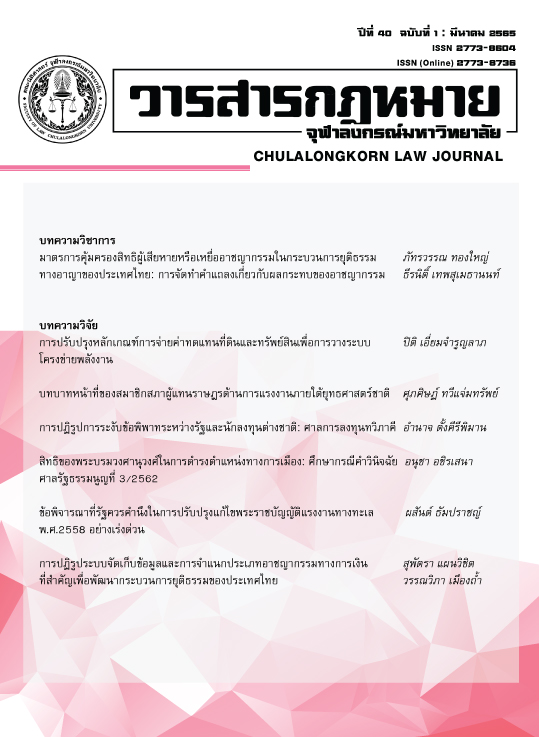สิทธิของพระบรมวงศานุวงศ์ในการดำรงตำแหน่งทางการเมือง: ศึกษากรณีคำวินิจฉัยศาลรัฐธรรมนูญที่ 3/2562
Main Article Content
บทคัดย่อ
เมื่อวันที่ 7 มีนาคม พ.ศ. 2562 ศาลรัฐธรรมนูญได้มีคำวินิจฉัยให้ยุบพรรคไทยรักษาชาติสืบเนื่องจากกรณีที่พรรคไทยรักษาชาติเสนอชื่อทูลกระหม่อมหญิงอุบลรัตนราชกัญญา สิริวัฒนาพรรณวดี ให้สภาผู้แทนราษฎรพิจารณาให้ความเห็นชอบแต่งตั้งเป็นนายกรัฐมนตรี โดยศาลได้นำประเพณีการปกครองประเทศไทยในระบอบประชาธิปไตยอันมีพระมหากษัตริย์ทรงเป็นประมุขมาใช้ในการวินิจฉัยคดี จากการศึกษาพบว่าคำวินิจฉัยนี้มีปัญหาในแง่นิติวิธี 2 ประการ คือ การนำประเพณีการปกครองประเทศไทยในระบอบประชาธิปไตยอันมีพระมหากษัตริย์ทรงเป็นประมุขมาใช้ ทั้งที่ยังมีบทบัญญัติแห่งรัฐธรรมนูญบังคับแก่กรณีได้ และการไม่พิสูจน์องค์ประกอบของประเพณี การปกครองประเทศไทยในระบอบประชาธิปไตยอันมีพระมหากษัตริย์ทรงเป็นประมุข ยิ่งไปกว่านั้น
คำวินิจฉัยนี้ยังมีนัยว่า พระบรมวงศานุวงศ์ทั้งที่ยังดำรงพระอิสริยยศอยู่หรือแม้ลาออกจากฐานันดรศักดิ์แล้ว แต่หากมีความใกล้ชิดกับพระมหากษัตริย์ย่อมไม่สามารถดำรงตำแหน่งทางการเมืองได้ ซึ่งส่งผลให้หลักเกณฑ์ว่าด้วยสิทธิในการดำรงตำแหน่งทางการเมืองของพระบรมวงศานุวงศ์ในระบบรัฐธรรมนูญไทยผันแปรไป และเกิดความคลุมเครือขึ้นว่าบุคคลใดบ้างที่อยู่ในข่ายไม่อาจดำรงตำแหน่งทางการเมืองได้โดยนัยของคำวินิจฉัยนี้ บทความนี้มุ่งวิเคราะห์ปัญหาในแง่นิติวิธีตลอดจนผลกระทบของคำวินิจฉัยดังกล่าว พร้อมทั้งเสนอให้มีการพิจารณาบัญญัติหลักเกณฑ์ว่าด้วยสิทธิของพระบรมวงศานุวงศ์ในการดำรงตำแหน่งทางการเมืองไว้ในรัฐธรรมนูญให้ชัดเจน
Article Details

อนุญาตภายใต้เงื่อนไข Creative Commons Attribution-NonCommercial-NoDerivatives 4.0 International License.
ลิขสิทธิ์และเนื้อหาในเว็บไซต์ของวารสารกฎหมาย (รวมถึง โดยไม่จำกัดเฉพาะ เนื้อหา รหัสคอมพิวเตอร์ งานศิลป์ ภาพถ่าย รูปภาพ ดนตรีกรรม โสตทัศนวัสดุ) เป็นกรรมสิทธิ์ของวารสารกฎหมาย และผู้ได้รับการโอนสิทธิทุกราย
1. วารสารกฎหมาย ให้อนุญาตให้คุณใช้สิทธิอันไม่เฉพาะเจาะจงที่สามารถถูกถอนเมื่อใดก็ได้ โดยไม่มีค่าใช้จ่าย ในการ
- เยี่ยมชมเว็บไซต์และเอกสารในเว็บไซต์นี้ จากคอมพิวเตอร์หรือเครื่องมือสื่อสารผ่านเว็บบราวเซอร์
- คัดลอกและจัดเก็บเว็บไซต์และเอกสารในเว็บไซต์นี้บนลงคอมพิวเตอร์ของคุณผ่านระบบความจำ cache
- สั่งพิมพ์เอกสารจากเว็บไซต์นี้สำหรับการใช้ส่วนตัวของคุณ
- ผลงานที่ได้รับการตีพิมพ์โดยวารสารกฎหมาย จุฬาลงกรณ์มหาวิทยาลัย ถูกคุ้มครองภายใต้ Creative Commons Attribution 4.0 International License ซึ่งอนุญาตให้ทุกคนสามารถคัดลอก แจกจ่าย ดัดแปลง ส่งต่อ ผลงานได้ ก็ต่อเมื่อผลงานและแหล่งข้อมูลได้รับการอ้างอิงอย่างเหมาะสม
2. วารสารกฎหมาย จุฬาลงกรณ์มหาวิทยาลัย สงวนสิทธิ์ไม่อนุญาตให้คุณใช้สิทธิอื่นใดที่เกี่ยวข้องกับเว็บไซต์และเอกสารบนเว็บไซต์นี้ เช่น การคัดลอก ดัดแปลง เปลี่ยนแปลง ส่งต่อ ตีพิมพ์ แจกจ่าย เผยแพร่ จัดแสดงในที่สาธารณะ ไม่ว่าจะในรูปแบบใดก็ตาม ซึ่งเว็บไซต์หรือเอกสารบนเว็บไซต์ โดยไม่อ้างอิงถึงแหล่งข้อมูลหรือโดยไม่ได้รับอนุญาตเป็นลายลักษณ์อักษรจากวารสารกฎหมาย จุฬาลงกรณ์มหาวิทยาลัย
3. คุณอาจขออนุญาตที่จะใช้เอกสารอันมีลิขสิทธิ์บนเว็บไซต์นี้โดยการเขียนอีเมลล์มายัง journal@law.chula.ac.th
4. วารสารกฎหมาย จุฬาลงกรณ์มหาวิทยาลัย เข้มงวดกับการคุ้มครองลิขสิทธิ์อย่างมาก หากวารสารกฎหมาย จุฬาลงกรณ์มหาวิทยาลัยพบว่าคุณได้ใช้เอกสารอันมีลิขสิทธิ์บนเว็บไซต์นี้โดยไม่ถูกต้องตามการอนุญาตให้ใช้สิทธิ ดังที่กล่าวไปข้างต้น วารสารกฎหมาย จุฬาลงกรณ์มหาวิทยาลัยอาจดำเนินคดีตามกฎหมายต่อคุณได้ เพื่อเรียกร้องค่าเสียหายที่เป็นตัวเงินและคำขอชั่วคราวให้คุณหยุดการใช้เอกสารดังกล่าว ทั้งนี้ คุณอาจถูกสั่งให้ชดใช้ค่าใช้จ่ายใดๆ ที่เกี่ยวข้องกับการดำเนินการตามกฎหมายนี้
หากคุณพบเห็นการใช้เอกสารอันมีลิขสิทธิ์ของวารสารกฎหมาย จุฬาลงกรณ์มหาวิทยาลัย ที่ขัดหรืออาจขัดต่อการอนุญาตให้ใช้สิทธิดังที่ได้กล่าวไปข้างต้น โดยเชื่อว่าได้ละเมิดลิขสิทธิ์ของคุณหรือของผู้อื่น สามารถร้องเรียนมาได้ที่ journal@law.chula.ac.th


